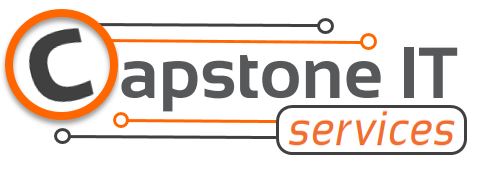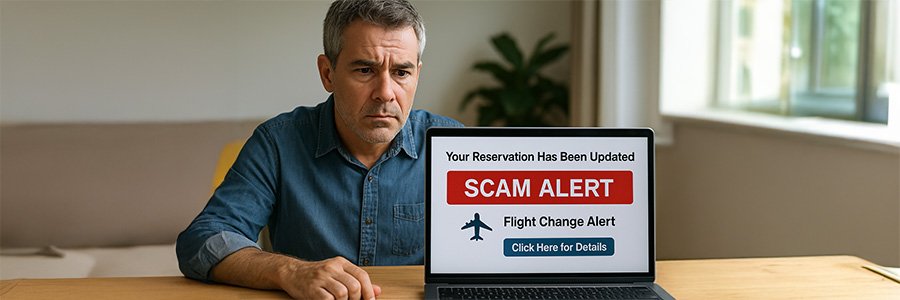As summer approaches, many South Florida business owners and employees are planning vacations or booking work-related travel. But cybercriminals know this too — and they’re targeting inboxes with fake travel confirmations that look alarmingly real.
At Capstone IT, we’re already seeing a rise in phishing scams disguised as emails from airlines, hotels, and booking platforms. These look like legitimate confirmations from companies like Delta, Marriott, or Expedia — but they’re anything but. Clicking the wrong link could infect your system with malware or compromise sensitive financial accounts.
Even the most tech-savvy teams in Palm Beach County and the Treasure Coast can get caught off guard.
How This Scam Typically Works
Step 1: A Fake Travel Confirmation Hits Your Inbox
- It may appear to come from a trusted name in travel.
- Hackers use real-looking logos, clean formatting, and sometimes even a fake “customer service” number.
- Subject lines are meant to create urgency:
- “Flight Change Alert – Click Here for Details”
- “Your Hotel Booking Needs Confirmation”
- “Last Step: Confirm Your Rental Car”
Step 2: You Click the Link – And Land on a Lookalike Website
- You’re prompted to log in, update payment details, or download an itinerary.
- The site looks authentic but is designed to steal your login credentials or credit card data.
Step 3: Your Info – and Possibly Your Business – Gets Compromised
- Enter your credentials? Now the hackers can access your airline, hotel, or financial accounts.
- Enter payment details? They’ve got your card.
- If there’s a malware attachment or redirect? Your device – and potentially your business network – could be infected.
Why These Scams Are So Effective
- They Look 100% Legit. Most people don’t second-guess a travel confirmation email — especially when it looks like the real deal.
- They Create Panic. Urgent-sounding subject lines push you to act quickly.
- People Are Distracted. Whether you're packing for a vacation or juggling work tasks, you’re less likely to scrutinize the sender.
- They Target Businesses, Too. Many companies in South Florida have someone responsible for coordinating employee travel. A single click by an office manager or executive assistant could:
- Expose a company credit card to fraud.
- Compromise credentials for corporate travel accounts.
- Introduce malware into your business network.
How South Florida Businesses Can Stay Protected
At Capstone IT, we help companies from Fort Pierce to Boca Raton avoid threats like these through proactive security measures. Here’s what we recommend:
✅ Never click travel links directly from email. Go straight to the website of the airline, hotel, or travel service instead.
✅ Check the sender’s email carefully. Look for slight misspellings or unusual domains (like @marriot-bookings.com instead of @marriott.com).
✅ Train your team. Especially those who manage bookings or handle travel expenses—make sure they know how to identify phishing attempts.
✅ Use Multifactor Authentication (MFA). Even if login info is stolen, MFA makes it harder for hackers to access accounts.
✅ Secure your business email environment. With the right filters and endpoint protection, many malicious emails can be blocked before they even reach your team.
Don’t Let a Travel Scam Disrupt Your Business
Cybercriminals are smart — and they know when to strike. During peak travel seasons, your employees and finances are more vulnerable than ever.
At Capstone IT, we specialize in helping South Florida businesses strengthen their cybersecurity posture and protect their operations from evolving threats.
🎯 Get started with a FREE Cybersecurity Assessment.
We’ll identify vulnerabilities, recommend improvements, and ensure your business is ready to fend off phishing threats like these.
📅 Click here to schedule your complimentary assessment today.

